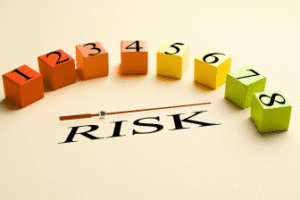
Offline Risk Management Course with Certificate
Offline Risk Management Course with Certificate
In today’s uncertain business world, risk management professionals are indispensable. India’s risk management industry will grow 15.2% annually, from USD 446 million in 2024 to USD 1,642 million by 2033 (IBEF, 2025), boosting demand for skilled professionals. A certification course provides face-to-face training in risk identification, measurement, and mitigation across finance, banking, insurance, and corporate sectors.
If you prefer classroom learning, live case discussions, and networking on campus, an offline diploma or course can be faster and more practical than online alternatives.
This article explains what to expect from an offline programme, how PGDRM-style diplomas fit in, GRMI’s role, and how to select the right risk management course.
Why Take an Offline Risk Management Course?
Graduates of classroom-based risk management courses report 20–30% higher starting salaries compared to online-only programs (NASSCOM, 2024).
This advantage stems from the immersive learning environment, which combines practical labs, group case work, and instructor feedback on both quantitative topics (VaR, stress testing, credit models) and qualitative topics (ERM, governance).
Additionally, classroom interaction with fellow students, guest lectures from banking professionals and regulators, and access to university placement services further enhance skills and employability. Most programmes also integrate in-class sessions with workshops or proctored exams, resulting in formally recognised certificates or diplomas that employers highly value.
What Does a Typical Offline Risk Management Certificate Course Cover?
Most face-to-face programmes adopt a syllabus integrating theory, tools, and case studies. Common modules include:
- Risk basics and types (market, credit, operational, liquidity, strategic)
- Quantitative tools: probability, statistics, VaR, stress testing, and basic risk modelling
- Portfolio management and credit risk
- Operational risk, business continuity, and vendor/third-party risk
- Enterprise Risk Management (ERM), including risk appetite and governance
- Indian regulatory requirements (RBI/SEBI/IRDAI), especially for banking/finance professionals
- Capstone project using Excel, basic database queries, and risk dashboards
This combination of quantitative and regulatory content mirrors authoritative course and executive programme modules.
Duration, Format, and Fees — What to Expect
Short certificate programmes usually run 3–6 months with classroom or weekend classes and are suitable for role-specific upskilling. Postgraduate diplomas (PGDRM-style) are typically one year full-time on campus, comprehensive, and include a final project.
Fees vary: short certificate courses in India cost approximately ₹20,000–40,000, whereas PG diplomas are higher depending on campus, faculty, and placement services.
About PGDRM and GRMI
PGDRM (Postgraduate Diploma in Risk Management) is a structured, in-depth programme covering strategic, financial, operational, and emerging risks. Many PGDRM programmes are one-year, on-campus, intensive courses.
GRMI (Global Risk Management Institute) offers accredited programmes and qualifications in risk. If a programme brochure mentions GRMI, check whether the credential is GRMI-branded, a certificate, or a training partnership.
Also, verify whether the issuing body provides continuing membership or professional designations.
Who Should Attend an Offline Risk Management Course?
- New graduates seeking risk, treasury, or credit analyst roles
- Banking and finance professionals specialising in credit, market, or operational risk
- Corporate professionals in compliance, audit, or consulting requiring ERM skills
- Managers who need practical understanding of risk reporting and governance
Eligibility varies: short courses usually accept graduates or working professionals; postgraduate diplomas may require a bachelor’s degree and sometimes work experience.
How to Select the Appropriate Offline Risk Management Diploma or Course
Checklist before enrolment:
- Syllabus Fit: Ensure the course covers the technical topics and Indian regulations you need.
- Faculty & Practitioner Input: Real-life faculty or visiting professionals provide practical insights.
- Assessment & Certification: Check if the certificate is awarded by the institute, a recognised external body, or both, and whether it involves proctored exams or graded projects.
- Placements & Alumni Outcomes: Review previous placement roles and sample employers.
- Batch Size & Practical Projects: Smaller batches allow more mentoring and practical sessions
Career Performance & Salary Prospects
In India, Risk Analysts earn ₹6–14 lakh annually, while experienced ERM professionals can earn ₹25 lakh or more (Glassdoor, 2025)
Whereas, graduates of applied certificate programmes and PG diplomas typically move into roles such as Risk Analyst, Credit Risk Associate, Operational Risk Officer, ERM Associate, or Compliance Analyst. Salaries depend on seniority, employer, and technical skills like credit modelling or market risk. Industry-recognised qualifications can command higher compensation.
Demand for these roles exists across banks, NBFCs, and consulting firms, according to institutional programme pages and market listings.
Conclusion
A risk management diploma or offline course offers a strong combination of theory and practical experience for building a successful risk career. Classroom programmes provide guided learning, live case discussions, and real-time mentoring, helping students understand risk in dynamic financial and corporate environments.
Risk management programmes in India, modelled on PGDRM courses and guided by institutions like GRMI, provide comprehensive industry-aligned education.
These courses enhance analytical and strategic thinking while offering professional credibility through accredited certificates.
FAQ’s
Q1: What is the duration of an offline risk management certificate?
Ans: Short certificates run 3–6 months (weekend or evening classes). PG diplomas (PGDRM-style) usually take one year on campus.
Q2: Will a certificate help me, or is a diploma better?
Ans: Certificates provide fast, job-focused upskilling. Diplomas (PGDRM) are more comprehensive, suitable for career shifts or full-time placement support. Choose based on time, cost, and goals.
Q3: Will an offline certificate help me get a job in banking?
Ans: Yes—if the course includes practical exercises, Indian regulatory coverage, and strong placement or alumni networks. Confirm industry partnerships.
Q4: Why should I think about GRMI for my PGDRM or risk management certification?
Ans: GRMI is a great option for establishing a career in risk management since it provides a well-organised, industry-aligned curriculum, knowledgeable instructors, internships, and placement assistance.
You may also like

Day in the Life of a Risk Analyst: Roles & Responsibilities

Which careers are truly safe from layoffs in 2026?


